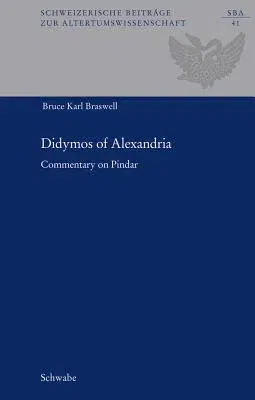Modern studies of Pindar have largely neglected ancient scholarship on
the poet. This is not entirely by chance, since the almost 1000 pages of
the scholia vetera on the odes presuppose an acquaintance with the
language and conventions of the Hellenistic grammarians who commented on
the Pindaric texts. While the scholia have not undeservedly been
criticized for containing a sizeable amount of dross, they have
nevertheless preserved the comments of major figures of Alexandrian
scholarship such as Aristarchos and Didymos whose interpretations are
not only of historical interest but can often contribute to a better
understanding of ancient texts. The Pindaric scholarship of Aristarchos
was the subject of two special studies, both of which appeared as long
ago as 1883, while Didymos has fared even less well. The only collection
of the remains of his Pindar commentary was published by Moritz Schmidt
in his 1854 edition of all the fragments of the grammarian known to him.
This was based on Boeckh's partial edition of the Pindar scholia
published in 1819. The present edition, which draws on Drachmann's
critical edition, not only offers a revised Greek text but also an
English translation with explanatory notes and full indices. An
extensive introduction, which situates Didymos in the scholarship of
late Ptolemaic Alexandria, includes the first modern critical catalogue
of all the works which are expressly attributed to him. While the
present work is primarily addressed to advanced students and
professional classicists, it is hoped that the presentation will ease
the entry of others into the fascinating field of ancient scholarship
which has now established itself as a special discipline.

